Key takeaways:
- Cultural competency workshops enhance understanding and empathy through shared personal experiences.
- Pro-life advocacy is not only about opposing abortion but also about supporting mothers and families.
- Key insights from workshops include the importance of language, self-reflection, and collaboration in effective advocacy.
- Continuous education and emotional intelligence are crucial for navigating difficult conversations and enhancing advocacy skills.
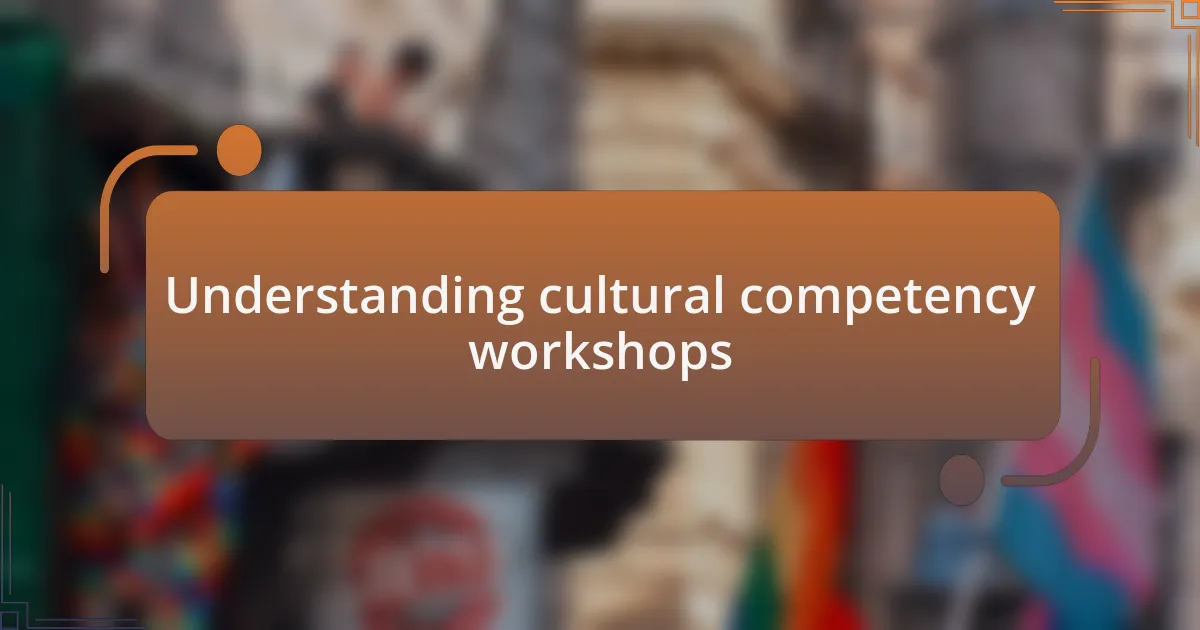
Understanding cultural competency workshops
Cultural competency workshops are designed to enhance understanding and appreciation of diverse backgrounds and experiences. I remember my first workshop vividly; it was an eye-opening experience that challenged my preconceived notions and biases. Have you ever left a discussion feeling like you saw the world through a different lens? That was exactly how I felt.
These workshops often involve interactive activities that encourage participants to share personal stories. During one particular exercise, I shared my own struggles with cultural misunderstandings. The collective experience created a safe space where emotions ran high, and connections became deeper. How can we truly advocate for life if we don’t understand the stories that shape each individual’s journey?
Furthermore, cultural competency isn’t just about recognizing differences; it’s about fostering empathy. I learned that by acknowledging the unique experiences of others, I could advocate for them more effectively. It makes me think: how often do we step outside our comfort zones to truly listen? Engaging in these workshops shaped my approach to advocacy, underscoring that understanding enhances our ability to serve diverse communities.
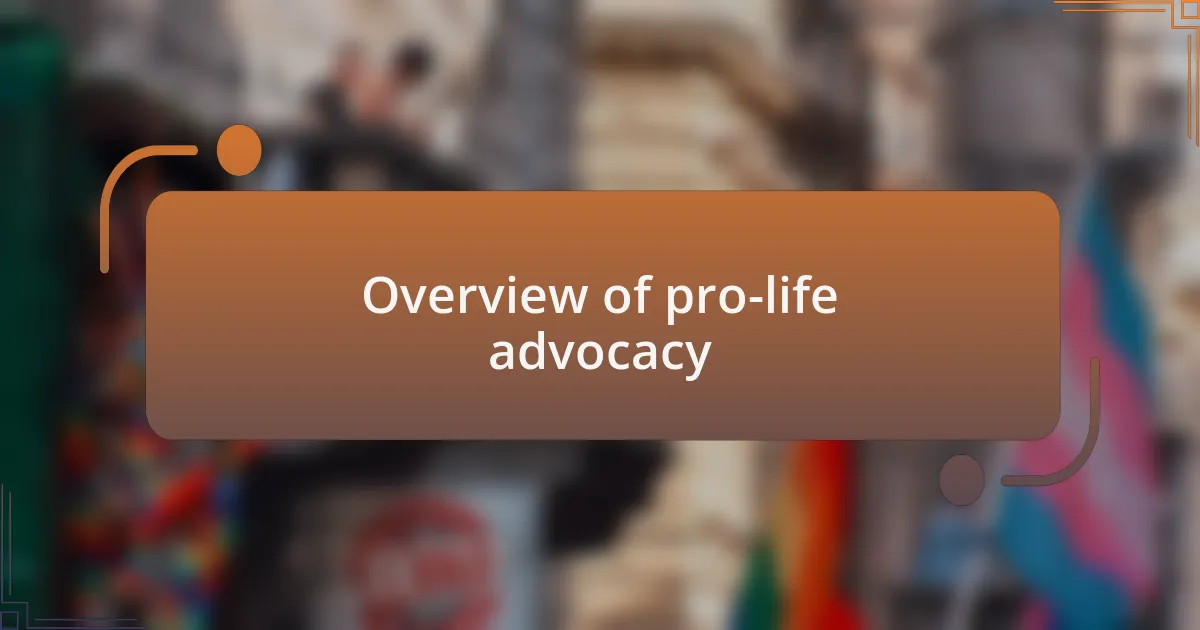
Overview of pro-life advocacy
Pro-life advocacy is centered around the belief in the inherent value and dignity of every human life, from conception to natural death. I’ve often found myself reflecting on the profound implications of this stance—especially when I encounter stories of individuals who feel marginalized or unheard. Have you ever considered how deeply personal stories can shape our understanding of life and death? Each narrative adds depth to the pro-life conversation, reminding us of the individuals behind the statistics.
In my experience, pro-life advocacy isn’t simply about opposing abortion; it’s a commitment to supporting both mothers and children. I once met a young mother who shared her journey of unexpected pregnancy. Her courage in choosing life, despite overwhelming challenges, inspired me to think about the broader support systems that should be in place. Isn’t it crucial that we provide resources and compassionate care to those facing such difficult choices?
Moreover, this advocacy extends into all areas of life—highlighting issues like healthcare access and social support for families. I remember volunteering at a center that offered resources to parents in need. Witnessing the relief and gratitude on their faces made me realize that pro-life isn’t just a slogan; it’s a call to action. How can we push for policies that affirm life if we don’t ensure that every individual feels equipped to thrive? Each action, no matter how small, can create a ripple effect in this vital movement.
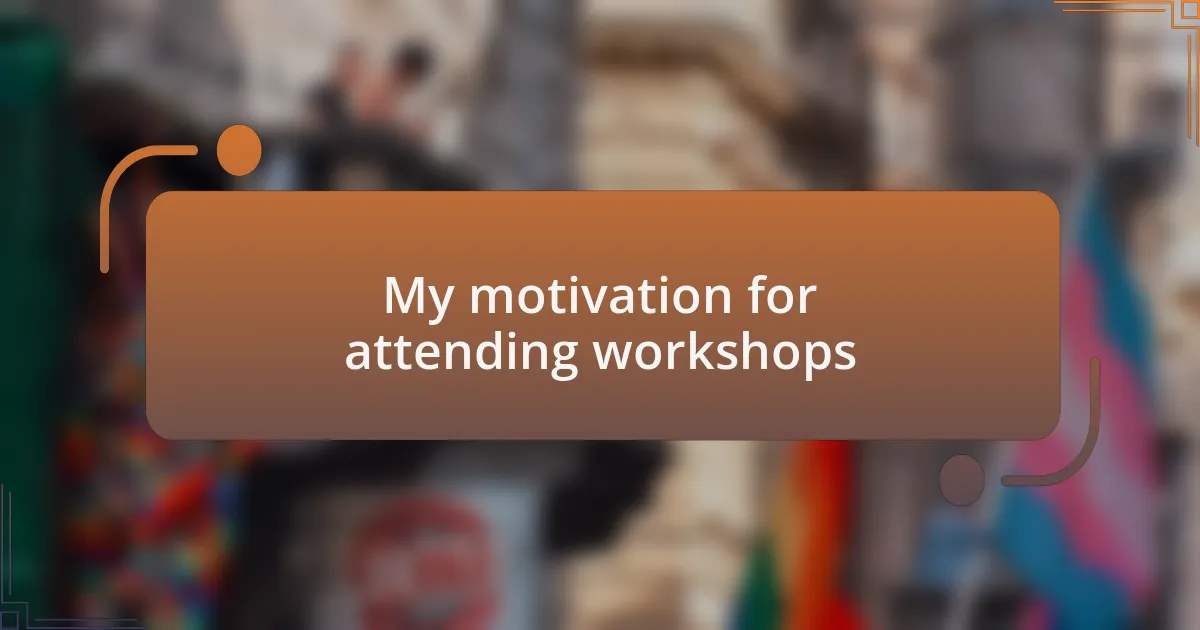
My motivation for attending workshops
My motivation for attending workshops stems from a desire to deepen my understanding of cultural competency, especially when it relates to pro-life advocacy. In one workshop, I vividly recall an interactive discussion that challenged my preconceived notions about different communities’ perspectives on life. It was eye-opening to hear firsthand accounts that illuminated the diverse experiences of individuals—such stories reminded me of the importance of empathy and compassion in our conversations.
One particular moment stands out to me: a participant shared their experience of feeling judged when seeking support during a crisis pregnancy. Hearing their pain made me confront my own biases and recognize that our movement needs to be inclusive. How can we claim to champion life if we don’t fully grasp the complexities surrounding each person’s situation? This realization only fueled my passion for engaging in further learning.
Ultimately, these workshops have become a pivotal part of my journey in advocacy. Each session reinforces that understanding diverse perspectives empowers us to communicate our pro-life message more effectively. I’ve found that the more I learn about others’ experiences, the better equipped I am to offer genuine support and build bridges of understanding within the communities we aim to serve.
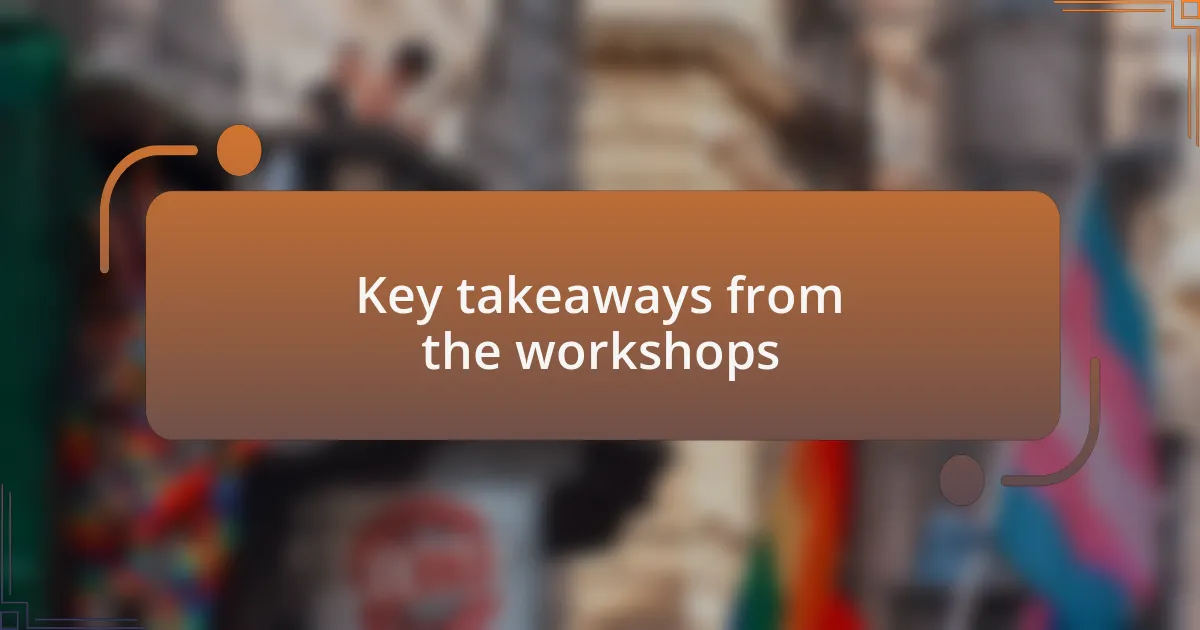
Key takeaways from the workshops
Key takeaways from the workshops reflect a profound shift in how I approach discussions surrounding life and advocacy. One memorable takeaway for me was the realization that language matters. During one session, we explored how specific words can shape perceptions and build or break trust. Listening to a facilitator discuss the impact of language on different communities made me rethink how I phrase my points. Are we truly considering the words we choose, or do we unconsciously fall into jargon that might alienate others?
Another powerful insight I gained was the importance of self-reflection in fostering cultural competency. An activity encouraged us to examine our own biases and understand how they might influence our interactions. After taking time for introspection, I found myself more open to listening rather than ready to respond. This shift in mindset allowed me to better connect with others and acknowledge that everyone’s journey is unique. How often do we pause to evaluate our own viewpoints before engaging in a conversation?
Lastly, sharing space with individuals from various backgrounds highlighted the strength of collaboration. One workshop culminated in a group project where we brainstormed ways to address common misconceptions about pro-life advocacy. It was exhilarating to work alongside people with different perspectives, all uniting for a common cause. This experience reminded me that our collective voices can create a more inclusive narrative—an essential step for anyone passionate about advocating for life. How can we harness this collective strength for greater impact moving forward?
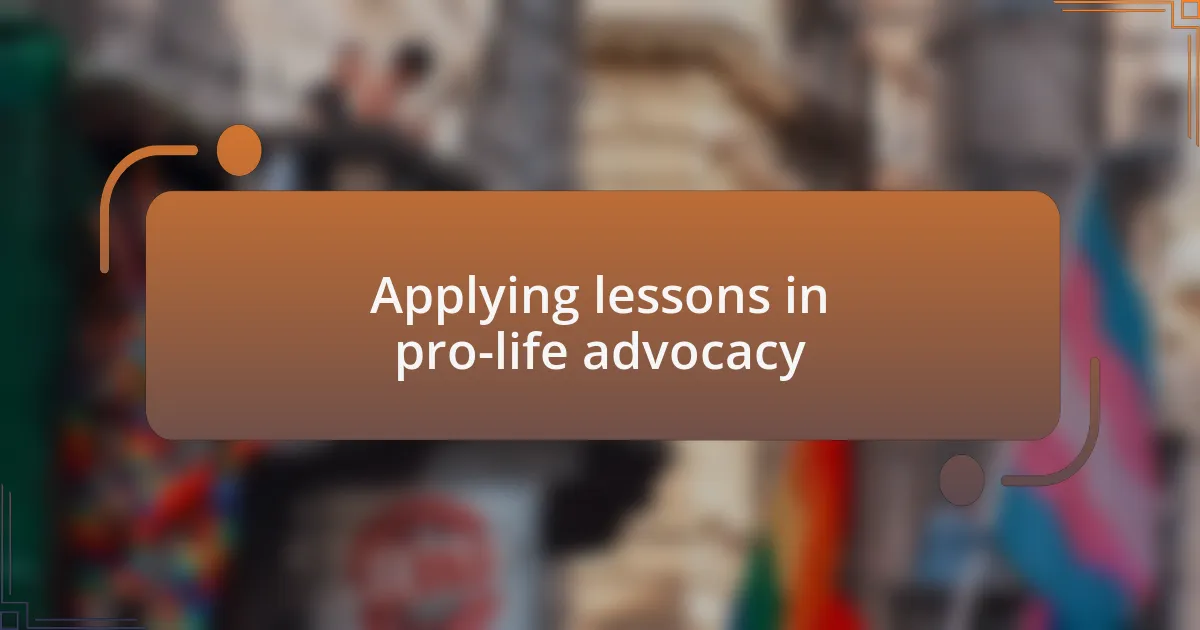
Applying lessons in pro-life advocacy
When applying the lessons from cultural competency workshops to pro-life advocacy, I’ve found that connecting authentically with individuals is crucial. I remember a particular conversation with someone who held opposing views. Instead of rushing to counter their arguments, I focused on shared values, such as the importance of family and community. This approach transformed our dialogue; it became less about winning and more about understanding. Have you ever considered how common ground can shift the tone of tough discussions?
Another lesson that resonated with me was the significance of empathy in our advocacy efforts. I recall a moment during a workshop when we practiced active listening—truly absorbing what others were saying without preparing a response. I realized that when I validated others’ feelings, even if I disagreed, the conversation became much more productive. This experience deepened my conviction that empathy fosters connections that can bridge divides. How can we better incorporate this practice into our outreach efforts?
Moreover, I’ve encountered occasions where I was challenged to step outside my comfort zone. In one session, we role-played various scenarios reflecting real-life advocacy situations. At first, I hesitated, feeling vulnerable, but once I embraced that discomfort, I found it enriching. It reminded me that growth often lies in those uncomfortable moments. What can discomfort teach us about effectively advocating for life?
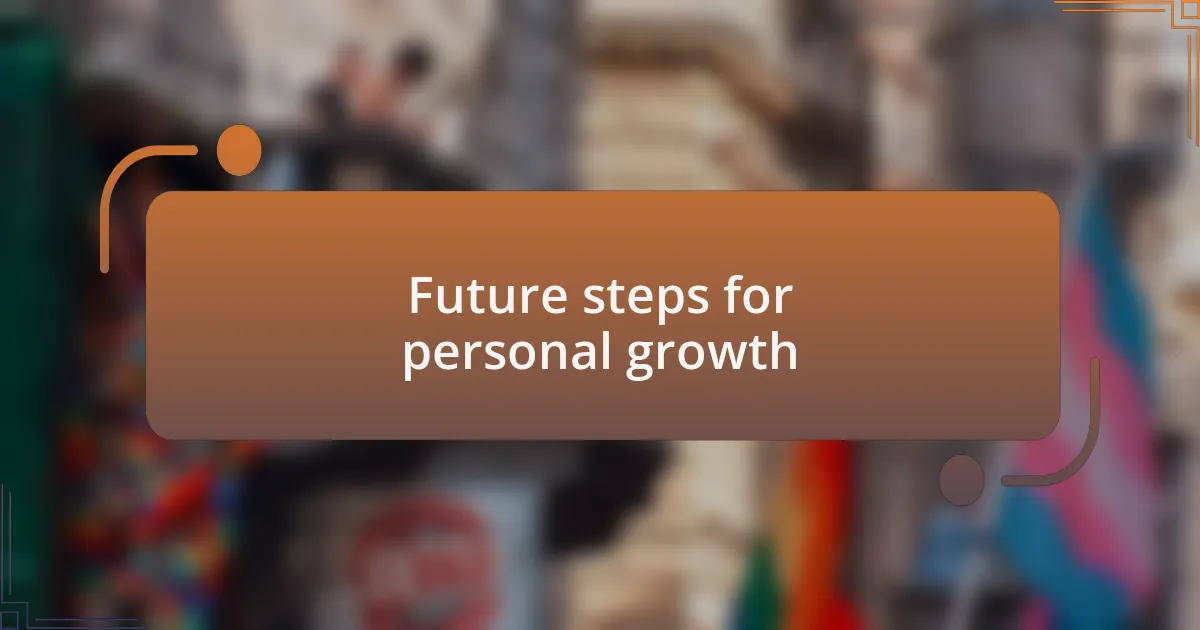
Future steps for personal growth
As I think about my future steps for personal growth, one key area I want to explore is my ability to engage in difficult conversations. During one workshop, I witnessed a peer expertly navigate a heated discussion by asking open-ended questions. This inspired me to practice similar techniques. I often wonder: how can shifting from a defensive stance to a curious mindset create meaningful dialogue that can change hearts and minds?
I also recognize the importance of continuous education. After attending the workshops, I felt invigorated to delve deeper into the histories and experiences of diverse communities. I enrolled in a few courses that cover topics like social justice and community engagement. Learning more about these subjects not only enhances my advocacy skills but also broadens my perspective. I can’t help but ask myself: how has learning about others’ experiences shaped my approach to pro-life issues?
Emotional intelligence is another aspect I want to refine. I’ve noticed that understanding my own feelings, especially in challenging discussions, can greatly influence the interaction’s outcome. Reflecting on past experiences where I felt overwhelmed or defensive has taught me to pause and reset my emotional state. This self-awareness allows me to engage with compassion rather than frustration. How can enhancing emotional intelligence transform my responses in advocacy scenarios?